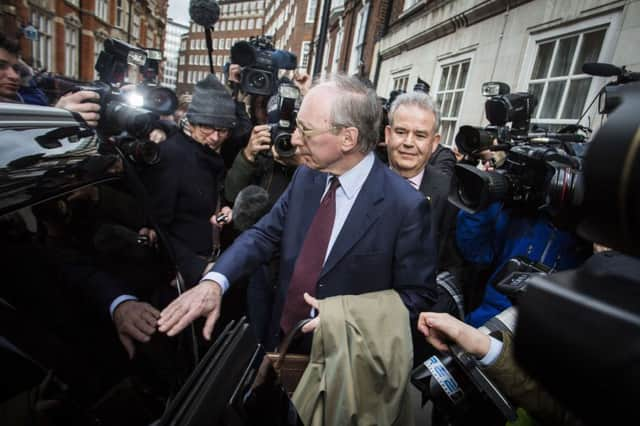PM defends second jobs as MPs defeat Labour ban


In clashes in the Commons yesterday, the Prime Minister rejected a call from Ed Miliband to “restore the reputation of the House” by banning politicians from holding paid directorships, consultancies or trade union roles. MPs defeated a Labour call for a ban in a Commons vote called in the wake of the latest cash-for-access controversy.
Defending the ability of MPs to carry out other work, Mr Cameron pointed out that he spent more time on his duties as Prime Minister than on matters linked to his seat in Witney, Oxfordshire.
Advertisement
Hide AdAdvertisement
Hide Ad“We have practising doctors in this House, we have practising dentists, we have people who take part serving our country in Afghanistan or Iraq and we do have people who run family businesses or have other interests,” the Tory leader said.
“What you want is a parliament where people can come and share their experience and make some points instead of just having a whole lot of trade union-sponsored ciphers.”
Mr Cameron added: “I think the most important thing we can do – and I certainly don’t rule out further changes – but the most important thing is to make sure we apply the rules.
“Paid lobbying: banned. Non-declaration of interests: banned. Making sure wrongdoing is investigated and punished. We are not making no change – we have just passed a lobbying Act and we have just passed a recall Act so people can sack their MP.”
Labour’s Commons motion was later defeated by 287 votes to 219, a majority of 68.
The vote came a day after former Conservative foreign secretary Sir Malcolm Rifkind stepped down as chairman of the committee that oversees Britain’s intelligence agencies and announced he was quitting as an MP after being caught by hidden cameras discussing the possibility of working for a fictitious Chinese company.
Sir Malcolm and former Labour foreign secretary Jack Straw – also caught in the sting by Channel 4’s Dispatches and the Daily Telegraph – said they have referred themselves for investigation by the Parliamentary Commissioner for Standards. Both deny wrongdoing. The office of Standards Commissioner Kathryn Hudson said she had formally launched an inquiry into Mr Straw after he referred his own case.
The probe is into allegations about “use of parliamentary resources, declaration of interests and lobbying”.
Advertisement
Hide AdAdvertisement
Hide AdHowever, no investigation has been launched into Sir Malcolm as he has not yet contacted the commissioner asking for one.
Labour leader Mr Miliband seized on the controversy to renew his demands for tougher restrictions. Labour candidates have already been told they will not be allowed to hold directorships or be consultants if elected in May.
But Mr Cameron argued that shadow education secretary Tristram Hunt was making more than 10 per cent extra as a college lecturer, saying it was a “very good thing”.
The Prime Minister said there was “fundamentally a disagreement” between the two leaders on whether parliament benefited from a range of experience.
He added: “At the moment I am both the member of parliament for West Oxfordshire and I am the Prime Minister. To be honest, I do do constituency work every day but I would be misleading the House if I said I spent more time on my constituency work than being Prime Minister and I think that’s worthwhile reflecting on.”
Meanwhile, veteran Tory Sir Peter Tapsell delivered a warning membership of the Commons would be confined to “obsessive crackpots” if second jobs were not allowed.
“I fear if people in this House are not allowed a second job, membership of it will soon be confined to the inheritors of substantial fortunes, or to rich spouses or obsessive crackpots or those unemployable anywhere else,” he told the House.
Sir Malcolm is said to have told undercover reporters he had time on his hands to take on outside work. In interviews he suggested people with a professional background could not be expected to be satisfied with an income of £60,000.
FOLLOW US
SCOTSMAN TABLET AND MOBILE APPS